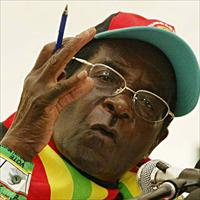ZIMBABWE: Third Way attracts followers
Who is behind the presidential bid of Simba Makoni remains a mystery, but the campaign of Zimbabwe's former finance minister says it has been able to field candidates in most constituencies for the general elections next month.
Although the overstretched Zimbabwe Electoral Commission (ZEC) is still computing the final list of candidates in the four separate polls to be run on 29 March, the Makoni camp claims it has managed to field candidates or strike alliances in all the 210 parliamentary constituencies and for 60 senatorial seats.
By contrast, the ruling ZANU-PF party's campaign has been dogged by trouble. There have been reports of candidates being imposed on some constituencies, of individuals openly defying the party and registering themselves, and of ZANU-PF members defecting to join up under Makoni's independent banner. Several cabinet ministers and MPs were turfed out in the party primaries, an indication of the level of disgruntlement.
In the past few weeks, ZANU-PF provincial party chairmen have been appearing on television to publicly distance themselves from Makoni, 57. They have included the leaders of Manicaland Province, in the east, where Makoni hails from, and Mashonaland East Province, in the northeast, the stronghold of political baron Gen Solomon Mujuru, who is widely tipped to support Makoni's political strategy.
"What has happened is absolutely disgraceful," President Robert Mugabe said on 21 February in a live broadcast, during which he lashed out at the man once considered his protégé. "So I have compared [Makoni] to a prostitute; a prostitute could have stood up and claimed she had many men in MDC [the opposition Movement for Democratic Change] and others in ZANU-PF."
Makoni was one of the youngest ministers in Mugabe's first post-independence government in 1980, before quitting a few years later. After the shock of ZANU-PF's near defeat by the MDC in 2000 he was part of a group of technocrats drafted in to help re-energise the government, but fell out with Mugabe over economic policy and resigned in 2002.
Although acknowledging support from within ZANU-PF, Makoni has insisted he was not a stalking horse for any political interests. "I'm nobody's man, I'm real; I'm Simba Makoni, I cannot be used by anybody," he said in a press conference last week.
Makoni's entrance in the race is likely to hurt the MDC - the official opposition that has been split into two feuding factions since 2005. Philip Moyo, a resident of the capital, Harare, told IRIN he had voted for the labour-backed MDC ever since it emerged to take on ZANU-PF in 2000.
"But as time moved on, unease and uncertainty began to creep in ... When their attempts to reunite were dashed after the two factions fought over how to share 'safe' constituencies, I gave up on politics until the emergence of Makoni. The opposition has been taking the people of Zimbabwe for granted for close to 10 years now, and the appearance of Makoni is like a fresh breath of air."
ZEC officials told IRIN that after Makoni announced he was standing against Mugabe, there was a 10-fold increase in newly registered voters. The winner of the 29 March ballot needs over 50 percent of the vote to avoid a second round run-off with his closest rival.
New energy
Makoni's bid has been endorsed by the smaller of the two MDC factions, led by Arthur Mutambara. "Makoni has put national interests ahead of personal ambition, unlike some pretenders in the political arena. That is why some of us are prepared to put on hold our presidential ambitions to support the national cause," Mutambara told IRIN.
Makoni's emergence has been dubbed the 'Third Way' scenario - an alliance between reformists in ZANU-PF and MDC designed to pull Zimbabwe out of its deep political and economic crises, in which inflation has hit over 100,000 percent and only two people in 10 can find work.
Publisher Trevor Ncube was one of the first to expound on the idea. Writing in one of his publications last week, Ncube said: "The Third Way to me is a way of thinking that rejects the mediocrity offered by the MDC ... My thinking was, and still is, that under ZANU-PF our society has collapsed and we need a new beginning that rejects ZANU-PF corruption, oppression, arrogance and mismanagement, and offers Zimbabweans an opportunity to dream again."
Ncube went on to endorse Makoni, saying: "The choice between the MDC and ZANU-PF under the current circumstances is no choice at all. Makoni's decision to stand as a presidential candidate in the elections at the end of March is a huge personal sacrifice that now must be supported by all Zimbabweans who desire peaceful change."
But ZANU-PF's liberation war veterans, who led the campaign to have Mugabe endorsed as the party's candidate, say they still stand by the veteran president, who turns 84 this week.
Jabulani Sibanda, chairman of the group, said despite reports that some of his members had abandoned the association, they still supported Mugabe. "I think the so-called war veterans who have joined Makoni are the ones who were in the MDC. We still stand by our president in the face of sell-outs and counter revolutionaries, whose plans we were aware of all along."
Information minister Sikhanyiso Ndlovu also threw his weight behind Mugabe. "The people forming alliances are people driven by political immaturity and not ideological cohesion; they are reacting to the hardships that we have experienced. But of course, that is their democratic right."
 Back and Next - Back and Next
Back and Next - Back and Next
 See Also - See Also
See Also - See Also